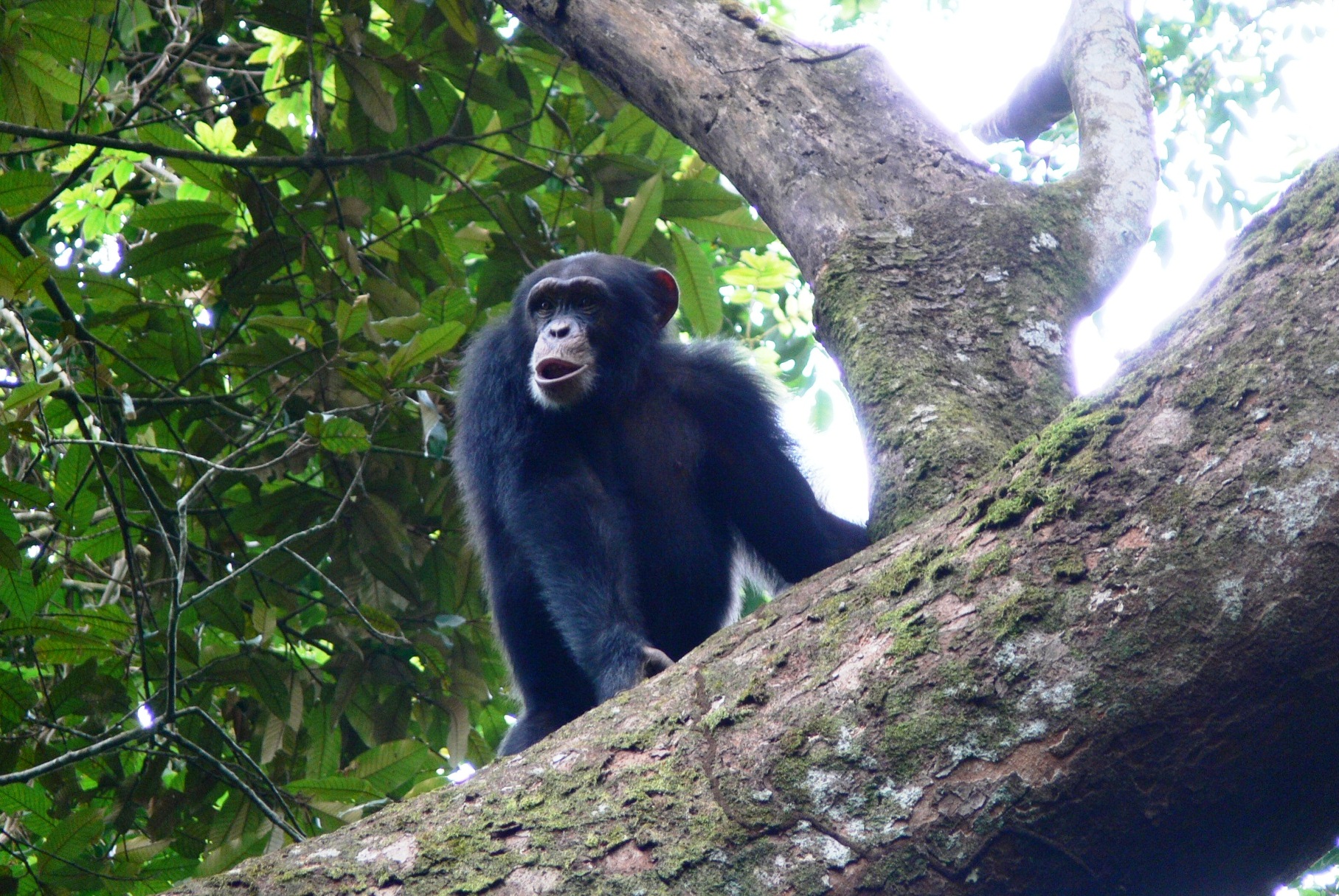
A new study by Kathelijne Koops finds the first evidence that chimpanzees regularly fish for and eat crabs.
In this study, we show that crab-fishing occurred more when the chimpanzees ate fewer army ants, thus suggesting a similar nutritional role.
Kathelijne Koops
The first evidence of chimpanzees fishing for and eating crabs is presented in a new study published today.
The study by Gates Cambridge Alumna Kathelijne Koops [2006] is published in the Journal of Human Evolution. It is the first time a non-human ape has been shown habitually catching and consuming aquatic fauna such as crabs and fish.
Previous research suggests that aquatic resources may have been an important component of the diets of hominins, which includes humans and their ancestors. The earliest evidence of hominins eating aquatic fauna dates back to 1.95 million years ago at Koobi Fora, Kenya, and includes the consumption of turtles, crocodiles and fish. Researchers believe regular consumption of aquatic fauna may have facilitated the initial onset of hominin brain growth in early Homo approximately two million years ago. It is thought that aquatic fauna would have provided essential long-chain polyunsaturated fatty acids (PUFAs), which are required for optimal brain growth and function, and that hominins living in wetland habitats may have relied on aquatic resources as a seasonal fallback food at times of food scarcity.
Despite the potentially important impact that aquatic resource consumption might have had for hominins, however, little is known about the environmental conditions and demographic factors that could have influenced consumption of aquatic fauna. Research on chimpanzees, humans' closest living relatives, could therefore shed light on what drove the use of aquatic resources during human evolution. The last common ancestor of chimpanzees and humans dates to approximately 6 – 8 million years ago, and was probably chimpanzee-like. Chimpanzees living today are a useful proxy to gain new insights into the aquatic foraging strategies of hominins.
Koops' team discovered that chimpanzees in the rainforest of the Nimba Mountains in Guinea consumed freshwater crabs year-round, irrespective of rainfall or fruit availability. "In this study, we show that crab-fishing occurred more when the chimpanzees ate fewer army ants, thus suggesting a similar nutritional role", lead author Koops explains. "We also discovered that female chimpanzees and their offspring fished for crabs more than predicted and for longer durations than adult males.”
Koops, who did her PhD in Biological Anthropology and is now based at the University of Zurich, adds that crabs may provide essential fatty acids, as well as micronutrients such as sodium and calcium, crucial for maternal and infant health. This may be especially important for females and young individuals who may have limited access to meat, she says.
“These findings on wild chimpanzees contribute to our understanding of aquatic faunivory among hominins,” says Koops, who conducted the work at Cambridge University’s Department of Archaeology and Anthropology, Zurich University’s Department of Anthropology and Harvard University’s Department of Human Evolutionary Biology.
‘’First, the fact that forest-living chimpanzees, can fish for crabs means that systematic reliance on aquatic faunivory is not restricted to lakeshore, river margin and coastal ecotones, as has been generally assumed. Second, aquatic fauna could have been a regular part of some hominin diets, rather than merely a seasonal fallback food. Third, the consumption of aquatic fauna could have been especially important for female hominins and their immature offspring. Eating crabs with high levels of sodium and calcium could have been a strategy used by pregnant and nursing females and fast-growing immatures to obtain sufficient amounts of this essential micronutrient.’’

Kathelijne Koops
- Alumni
- Netherlands
- 2006 PhD Biological Anthropology
- St John's College
I obtained my MSc in Biology at Utrecht University in the Netherlands before attending the University of Cambridge, where I completed my PhD in Biological Anthropology in 2011. Subsequently, I was a Junior Research Fellow at Homerton College and a Post-doctoral researcher in the Department of Archaeology & Anthropology at Cambridge. In 2014 I took up a Post-doctoral position at the University of Zurich. In 2020-2021 I was a Lecturer in Primatology in the Department of Archaeology at the University of Cambridge. Since 2021, I am a Professor in the Department of Evolutionary Anthropology at the University of Zurich in Switzerland.
My research applies an interdisciplinary approach to investigating the evolution of tool use. Complex technology is a defining trait of our species. Human technological innovations have reshaped our planet and changed the impact of evolutionary forces upon our lives. Despite the enormous significance of human technology, the evolutionary origin of this complex use of tools is not well understood. By studying humans’ closest living relatives, the great apes, I hope to identify the processes driving the use of technology across ape species and, in turn, shed light on What makes us human?
Previous Education
Utrecht University M.Sc Biology 2005












